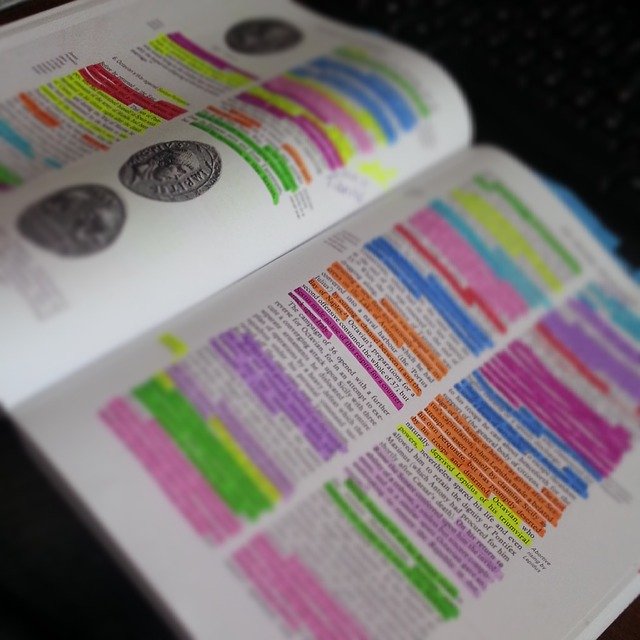When you are reading, have a conversation with the text. If you think, “I do not agree with this.” Write a symbol (e.g., * ! + = ) in the margin of your book when you think that something is important, stands out, or seems odd. Make that notation stand out! This is particularly important when reading a novel because it’s more difficult to find a particular scene or quote when you have to search through 200 pages than it is when reading a short story.
For instance, when you find something is “funny” create a specific symbol and place it next to the text. Then, when you are writing your paper at 2 AM you can find all of the “funny” = “¶” sections every time you see a ¶. You might also use different colors of highlighters to represent theme, character, symbolism, etc, so you can easily find sections of the text. Another tool is to use different colors of sticky notes or even a notebook where you can record important information and page numbers. (Using sticky notes or a notebook is particularly useful when you don’t own the book!)
At the end of each chapter jot down notes. Utilize the back of books, where there are often blank pages. Writing your notes in the back guarantees you’ll always have them with you.
After you have finished the book, transcribe your notes including page numbers into a Word doc. You should include a bibliographic entry at the top of your document, this way you tackle two tasks at once: documenting the original reference and you have your notes handy when you write your paper.
(RE)READING
- On a first read, one often misses a lot of details. Do not be surprised if you have overlooked points. Rereading is something everyone should do before writing any paper.
Video on how to annotate a text:
Special Notes for Reading a Digital Text
Even if you take primarily face-to-face classes in college, you’ll likely find that a significant amount of the reading you’ll have to do in college comes from online sources: articles on the Web, online library databases, e-books. The academic reading process of previewing, active reading, summarizing, and reviewing can be used to read these online materials, just like any other text.
However, effective online reading takes time and practice, and you need to carefully consider your approach. Read on for a list of tips that can help you successfully complete your online reading.
Eliminate distractions to maintain focus
In addition to the usual distractions found in a space (like people, cell phones, and televisions), online readers can be easily distracted by computer features (like games, instant messaging, and Facebook). Shut these programs off, and make sure your environment stays focused. You can even download tools to block programs that might cause distractions for a set period of time to help you maintain your willpower.
Set a time limit
Reading from a computer screen can cause eye strain, so plan to read for shorter periods of time. For example, read for about 30 minutes and then take a 10 minute break away from your monitor. Use this time to think about what you just read and identify the key points or themes.
Identify why you are reading
Knowing why you are reading will help you decide exactly what strategies you should use. Choose a strategy based on your learning purpose. When reading a novel for a literary comparison, your purpose is two-fold. You should be reading for enjoyment and understanding, but you also need to take note of key elements so that you can use your thoughts to create a clear argument.
Consider saving the document you are reading in a form you can manipulate
After evaluating the document you plan to read, save it to your personal files as a PDF or a Word Document. This allows you to highlight key ideas or make summary notes in the margins of the document itself.
Get prepared to take notes
Whether you choose to use paper or a computer program, it is important to record important ideas for future reference. Have paper and pen readily available or open a blank Word document, so you are prepared to take notes once you start reading.
Record important information on your note paper or in your Word document. Note taking helps you understand ideas and ensure you have the material for later reference. Be sure to record ideas in point form and in your own words and experiment with different note taking strategies to find one that suits your needs.
If you feel you might need the information for an assignment, record the document’s reference information next to the notes you created. This step is important since you must cite all the references you draw on in assignment and papers. It is easier to do this step now rather than later when you may have forgotten the website address.
Read difficult material out loud
Sometimes it is helpful to hear what you are reading, especially if the material is complex or difficult to understand. Study in a space where you can read aloud to yourself. Alternatively, you can ask a friend or family member to review complex material with you. When two people look at information together, they can usually make sense of difficult materials.
Conclusion
An immense amounts of online resources are available to you. By using effective strategies and following the above suggestions, you will increase your chances of successfully accomplishing your reading task.
Attributions
Content adapted from “How to Read a Novel” from “Analyzing Literature (and Film) and Analyzing Texts” licensed CC BY NC.
“Special Notes for Reading a Digital Text” adapted from “Online Reading Tips” by Course Hero licensed CCBY.



